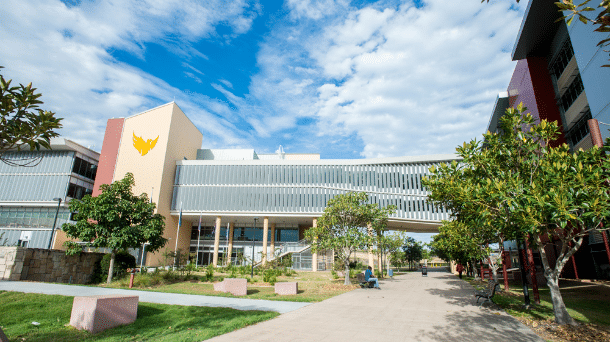A solar carpark at the University of South Queensland (USQ) has been recognised at the 2017 Solar Design and Installation Awards.
The innovative 1.1MW solar carpark shading system won its category at the Clean Energy Council’s award night.
The award in the ‘Over 240kW’ category was announced at the All-Energy Australia Exhibition and Conference in Melbourne.
The combined USQ solar carpark includes the campuses of Toowoomba, Springfield and also Ipswich.
As a result, the university will become more energy efficient as part of its Sustainable Energy Solution Project.
It will help the university reduce electricity costs as well as daytime grid electricity consumption.
Total carbon emissions should also be lowered by 20 per cent under the project.
Solar carpark part of broader renewables plan
The carpark is part of a larger plan to reduce emissions and boost energy efficiency at the USQ campus.

In addition, the university will continue to take positive action intended to offset its energy requirements, according to USQ Executive Director (Campus Services) Dr Dave Povey.
Mr Povey said the Sustainable Energy Solution Project is a key component of its energy commitment.
The university’s short and long-term energy-related costs will be reduced under the program. A significant platform for research, learning and teaching will also be provided.
The sustainability project also demonstrates USQ’s commitment to its social responsibilities via renewable energy uptake.
Energy storage batteries are also included as part of the solar carpark project.
USQ solar carpark follows Australia-wide trend
Solar carparks are growing in popularity, with two other significant projects hitting the headlines this year.
In May, Western Australia announced the state’s first solar carpark at Northam Boulevard Shopping Centre. The solar panel project will power 40 per cent of the centre’s annual electricity needs.
And Australia’s largest solar carpark canopy project has now been completed at Westfield Marion Shopping Centre in Adelaide.
With 240 parking spaces covered by 14 separate solar canopies, the system has a collective capacity of 647kW.
As well as producing green power, the solar canopies provide much-needed shade for vehicles on hot days.













































